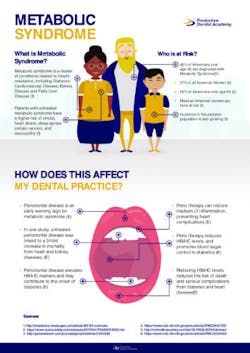Metabolic syndrome: Its connection to oral health and how to treat your patients effectively
Your dental patients who have high blood pressure, cholesterol problems, or trouble controlling blood sugar levels have something in common. They are displaying symptoms associated with metabolic syndrome. Should their medical issues affect your approach to the treatment of their oral health? Vicki McManus Peterson, RDH, and Bruce B. Baird, DDS, explore the changes you can make in your dental practice to strengthen your patients' systemic health.
Editor's note: This article first appeared in DE's Breakthrough Clinical with Stacey Simmons, DDS. Find out more about it and subscribe here.
A long-time patient presents to your office and mentions that she’s just been diagnosed with high blood pressure. Another patient is having cholesterol problems. A good third of your retired patients struggle to control their blood sugar levels. Do these patients have anything in common? Should their medical issues affect your approach to the treatment of their oral health?
Your patients are showing symptoms associated with metabolic syndrome. Metabolic syndrome occurs when the body develops insulin resistance. Because insulin is essential to cell function, losing the ability to use it effectively causes a huge range of systemic health issues. Eventually, if left untreated, metabolic syndrome leads to diabetes and heart disease. The National Institutes of Health predicts that in the near future, metabolic syndrome will surpass smoking as the most common cause of cardiovascular disease in Americans.
Metabolic syndrome isn’t just an issue for primary care providers (PCP). A growing body of evidence points to a link between oral inflammation and metabolic syndrome. There are steps that you, as a dental health professional, can take to improve your patients’ symptoms. There are practical ways to address metabolic syndrome with your patients that will make a positive difference in their health outcomes. You may even save a few lives by changing how you educate your staff and patients, as well as how you structure your appointments.
An educated staff is an effective staff
Your hygienists probably heard about the oral-systemic health link when they were in school, but the body of research on the subject grows constantly. As more Americans develop metabolic syndrome, we’re learning more about how conditions such as oral bacteria, inflammation, and sleep apnea affect overall health.
Use research and data to teach your staff how oral health can affect the risks for heart disease and stroke. You will be making changes in your practice protocol, so you need all of your staff—from the front office to the hygienists to the billing department—to be on board with the new system. When they realize that you’re making a practical effort to help patients and improve the health of your community, they’ll embrace their new roles.
Use an in-service day to build enthusiasm. Invite speakers who will address the oral-systemic health link. Contact the local hospital’s education department to find nurse-educators who can explain metabolic syndrome and associated conditions. Include some role-playing, so your team can practice interacting with patients who have metabolic syndrome. Make it your goal to get everyone excited about improving patients' cardiovascular health.
Helping patients understand their risk factors
After your staff understands your new approach to metabolic syndrome, it’s time to educate your patients. You may be met with resistance at first. Many patients don’t think of dental and medical health are part of the same spectrum. In their minds, there’s a "tooth and gum" box and a "diabetes and heart disease" box—not one big "overall health" box.
All patient education about metabolic syndrome should be person-to-person, because it's a critical matter. You can’t outsource it to glossy brochures or helpful videos. You and your hygiene team need to be ready and willing to talk to patients about how the state of their mouth affects the state of their overall health.
You may want to designate a specific team member to be the metabolic syndrome educator. That person can be in charge of keeping up with current research, educating patients, and even following up after appointments. You should also add a section on metabolic syndrome to your website and compile a list of helpful links and articles for patients who want to know more.
As you educate your patients, remind them that you’re concerned because you care about them. Explain that you want them to live long and healthy lives. Oral health is one part of the metabolic syndrome equation that they can actually control. They’re stuck with their genes. Diet and exercise are easy to recommend, but hard to implement. Oral health is a great starting point for reducing the risks of heart attack and stroke.
Restructuring your appointments
Once you have a plan to educate your staff and patients, it’s time to restructure your appointments and services so that you can better address metabolic syndrome in your patients. Your particular configuration will depend on your office, staff, state laws, and community.
Here are some possible changes you might want to include in your appointments:
- Update the medical history at each appointment. Move beyond asking, “Have there been any changes in your health?” Take time to ask your patients about specific conditions and give them time to think about their answers.
- Take a blood pressure reading at the beginning of each appointment. Many Americans only visit the doctor when they’re already sick, and that can affect their blood pressure. By taking your patients' blood pressure at every appointment, you can give them valuable information about their baseline reading and let them know if it has crept up over the last six months.
- Partner with a local lab to offer tests to patients who don't have a PCP. Uninsured patients who don’t see a doctor regularly may not even know how to obtain blood sugar and cholesterol checks. Many companies, such as Lab One and Quest Diagnostics, offer discounted lab tests to cash-paying patients. You can offer referrals for testing without having to draw blood in your office. When you connect patients with the care they need, you improve their overall health.
- Make connections with PCPs in your community, and find physicians who agree to see your patients. Your patients who have signs of metabolic syndrome may need help finding a good physician to manage their medical issues. Be ready to make referrals. Develop a working partnership with several PCPs who will see your patients who need treatment for diabetes or high blood pressure, and, in turn, you will see their patients for oral health treatment. Dentist-physician partnerships improve community health.
- Offer testing for oral bacteria so you can spot problematic strains. Certain strains of bacteria—for instance, Streptococcus tigurinus—are linked to an increased risk for heart attacks and other cardiovascular issues. Offer testing to high-risk patients so they can take steps to improve their oral microbiome and reduce their risks.
- Be proactive about offering extra appointments to at-risk patients. Many health insurance plans cover extra cleanings for adults with diabetes, since oral inflammation can lead to problems with blood sugar control. Patients at risk for heart disease who also suffer from periodontitis may need to be enrolled in a more aggressive perio program. Be proactive in explaining how extra cleanings or more focused periodontal care can improve overall health.
- Remember to discuss sleep apnea appliances. Sleep apnea is a major risk factor for conditions associated with metabolic disorder, but many patients don’t like using CPAP machines. If patients mention sleep apnea while going over their medical history, be sure to educate them about custom oral appliances. Most patients have no idea that you have the ability to help control their apnea.
People generally trust their dentists, which places you in a unique position to improve your patients’ overall health and wellness. When you focus on the oral-systemic health link, you can make concrete, positive changes in the lives of your patients.
Editor's note: This article first appeared in DE's Breakthrough Clinical with Stacey Simmons, DDS. Find out more about it and subscribe here.
Author's note: Interested in learning more? Check out a free white paper, "4 Keys to Transforming Your Hygiene Department."
Sources
- National Institutes of Health. National Heart, Lung, and Blood Institute. What is metabolic syndrome? NHLBI Health Information Center website. https://www.nhlbi.nih.gov/health/health-topics/topics/ms. Updated June 22, 2016. Accessed June 27, 2017.
- Cell Press. Connection between mouth bacteria, inflammation in heart disease. ScienceDaily website. www.sciencedaily.com/releases/2015/04/150416132205.htm. Published April 16, 2015. Accessed June 27, 2017.
- Society for General Microbiology. Newly identified oral bacterium linked to heart disease and meningitis. ScienceDaily website. www.sciencedaily.com/releases/2012/02/120222093941.htm. Published February 22, 2012. Accessed June 27, 2017.



